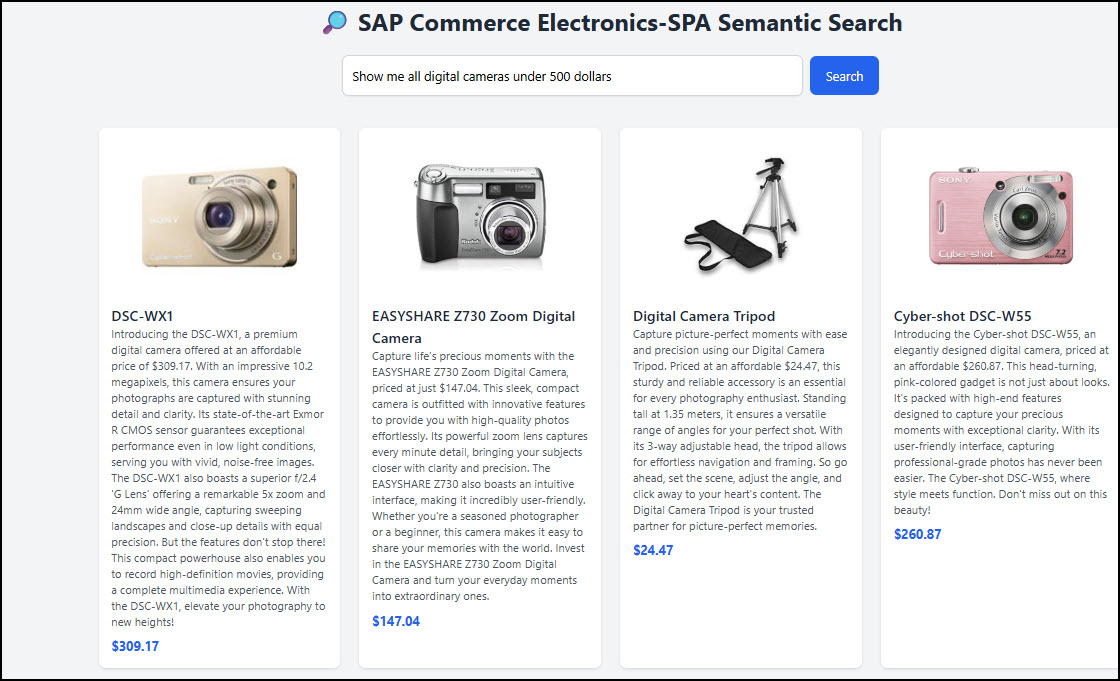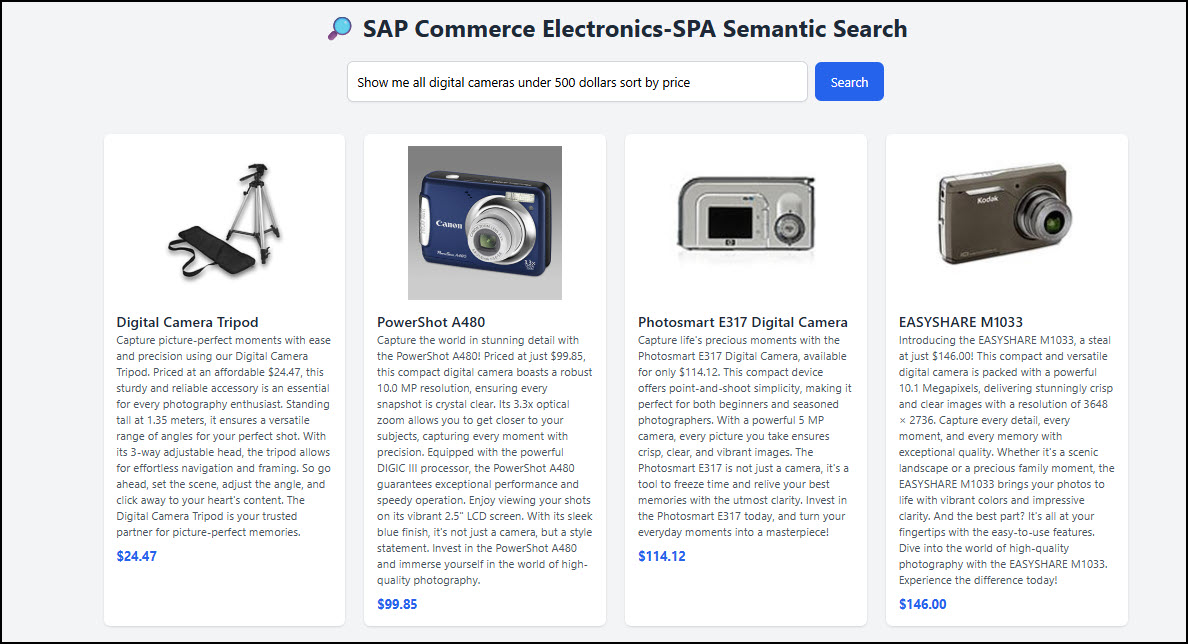Introduction
As e-commerce evolves, so do user expectations. Today’s customers want more than keyword-based results—they expect intuitive, natural, and personalized product discovery. Traditional search tools like Apache Solr, while dependable, fall short in understanding what users actually mean.
That’s why we’ve launched a live beta version of a new Semantic Search experience:
semanticsearch.hybrisarchitect.com
This beta site completely replaces Solr with an AI-powered search engine designed to understand natural language and deliver results based on intent, not just matching words.
Try it with queries like:
- Show me all digital cameras under 500 dollars

- Show me all digital cameras under 500 dollars sort by price

The system doesn’t just return keyword matches—it interprets the query, extracts filters, and ranks products by relevance. This is not an enhancement to Solr—it’s a replacement.
What Is Semantic Search?
Semantic Search is a modern, AI-native approach that delivers smarter, more relevant search experiences. It replaces traditional Solr indexing with:
- Semantic Understanding – Interprets the meaning and context of queries.
- Generative AI Parsing – Uses OpenAI models to extract structured filters like price, category, and sort order.
- Vector-Based Similarity – Matches queries to products using embeddings and cosine similarity.
- Personalized Relevance – Prioritizes results that reflect user intent and context—not just terms.
Key Features
Built from the ground up to replace Solr in SAP Commerce environments:
- Natural Language Query Parsing – Understands free-text input and extracts relevant filters and actions.
- In-Memory Vector Search – Performs fast, intent-based searches using embedded product vectors.
- Live Product Sync – Pulls real-time data from SAP Commerce OCC APIs and generates embeddings.
- Intent-Driven Ranking – Results are ordered based on how closely they match the meaning of the query.
- No Faceting Setup Required – Facets are not needed for semantic search to work—but facet filtering can be supported if your storefront requires it.
How It Works
The beta uses the Electronics SPA catalog from the Spartacus demo site as its product data source. Here’s the end-to-end flow:
1. Product Embedding
- Data is fetched via the SAP Commerce OCC API.
- Product name, summary, and price are combined into a single text block.
- The block is sent to OpenAI to generate a semantic embedding.
2. Storing Embeddings
Embeddings are stored in an in-memory vector database optimized for fast cosine similarity comparisons.
3. Query Handling
- The user query is parsed using OpenAI to extract intent, filters, and sort preferences.
- The query is embedded and compared to stored product vectors.
- The closest matches are returned, ranked by semantic relevance.
Why Replace Solr?
While Solr served SAP Commerce well for many years, it was built for a different era. Here's why Semantic Search is a forward-looking replacement:
| Feature | Apache Solr | Semantic Search |
|---|---|---|
| Keyword Matching | ✅ | ✅ (optional) |
| Natural Language Understanding | ❌ | ✅ |
| Vector-Based Relevance | ❌ | ✅ |
| Personalized Context Awareness | ❌ | ✅ |
| AI-Powered Query Parsing | ❌ | ✅ |
| Manual Indexing Configuration | ✅ | ❌ |
| Real-Time Sync via OCC | ❌ | ✅ |
| Fast In-Memory Search | ❌ | ✅ |
| Faceting Support | ✅ | ✅ (optional) |
Getting Started
Replacing Solr is simpler than you might think:
- Deploy the Semantic Search Microservice – Powered by Javalin, OpenAI, and a vector store.
- Connect Your SAP Commerce OCC API – Automatically sync and embed your product catalog.
- Update Your Search Endpoint – Route search traffic to the new Semantic Search REST API.
- Customize and Extend – Tune parsing logic, similarity thresholds, and product metadata embeddings.
Conclusion
Semantic Search isn’t an enhancement to Solr—it’s a smarter, scalable, AI-native replacement that transforms how product discovery works in SAP Commerce. With vector-based intelligence and natural language understanding, your search bar becomes a true digital concierge.
Next up: In Article #3, we’ll cover: Replacing Solr Faceted Search with Vector-Based Filtering.
Let’s move beyond keywords—into meaning, context, and intelligent commerce.



